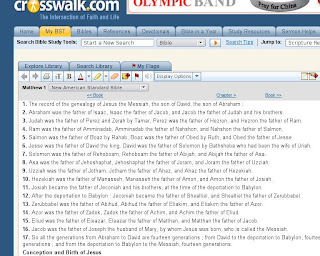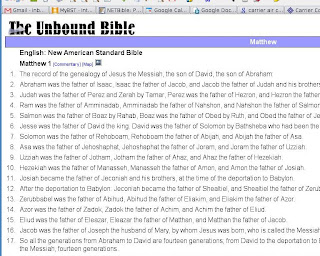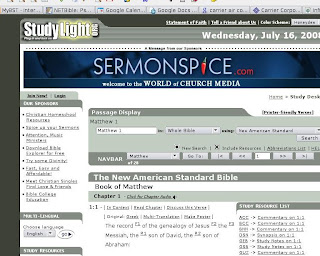A perennial question, and one that can be a barrier for some to completely embrace Christ. If salvation is through Christ alone, what about those who live in a place and a time where they can't hear about Christ? Are they to be eternally judged because they don't embrace Him, even though there's no news of Him where they are?
This is an enormous question, and we can't answer it all in one blog, obviously. But I'd like to take a few blogs to explore the question.
The first is to consider the following truth: God never reveals too little for us to be able to accomplish His will for us. In other words, God does not expect us to respond to revelation that He has not given us.
Romans 1:18-23 says that God's invisible attributes are made evident through everyone through Creation. Acts 14:17 says that God did not leave any people group without a witness based on His acts of provision. So, God does give a responsible amount of revelation to everyone, and in both of these passages in context, He holds people accountable for how they respond to the amount of revelation they have received.
This does not fully answer this amazing question, but it does lay down one very important principle that we must remember: God never reveals too little for us to be able to respond to Him in a way that He expects.
Showing posts with label theology. Show all posts
Showing posts with label theology. Show all posts
Wednesday, September 16, 2009
Tuesday, July 15, 2008
More Great Online Resources

In the past, I've told you about some great online resources for studying the Bible and theology. For example, The NET Bible (http://bible.org) is one of my favorite sites (see also http://net.bible.org). On this site, you can study various translations, get help with the original languages, sign up for self-paced lessons in theology, and read blogs by excellent theologians. This site is primarily related to the NET translation, but it also shows parallel translations. It is an excellent site for word studies and original language parsing. But there are a few more that I've been using that you might be interested in.
(Click on any of the images to see more detail.)

Crosswalk has a fairly good set of Bible Study Tools (http://beta.biblestudytools.com). There are many translations, original language helps, commentaries, Bible dictionaries, lexicons, devotionals, Bible-in-a-year reading plan, and so on. It's similar to net.bible.org in many ways, but you can choose which translation is your primary.
However, it doesn't have the theology program that the NET site does. One of best features of Crosswalk's site is that it allows you to highlight text and save personal notes for individual verses. The support for original languages is not bad, but for some reason, they are not offered in the parallel translations view.

Another similar site is the eBible (http://ebible.com). It is not as feature-rich as the other two sites, but I like the fact that the footnotes and cross-references are visible as "flyovers" - just put the mouse cursor over the footnote marker, and the footnote pops right up in a little, non-instrusive box. Most of the other sites require you to click on the footnote, and you are navigated away from the verse you were reading. This site also has a helpful tool for memorizing Scripture.

Biola University has a well-respected site called the Unbound Bible (http://unbound.biola.edu). It has a powerful search engine and a fantastic selection of translations in many languages. A minor downside of this site is that it is not quite as user-friendly and attractive as the others.

Study Light (http://studylight.org) also does multiple translations and original language helps. The user interface is a bit constricted, but they have a unique offering of articles and other resources. They also offer more commentaries than most others, and they are easily accessible.

The Bible Gateway (http://biblegateway.com) offers plenty of punch, too, which a good selection of translations in many languages. The interface is simple, clean, and attractive, and it offers a nice set of tools and helps.

Also worth noting is the website offered by the publishers of the ESV translation (http://www.gnpcb.org/esv). They have a few devotions, an easy-to-use search engine, a daily reading plan, and some footnotes. This is a good site if the ESV is your translation of choice, but the ESV is also available on some of these other websites with all the tools (such as eBible, Bible Gateway, Study Light
Almost all of the sites offer a similar library of dictionaries and maps, although each site has something unique in its library. Many offer audio versions of the passage you're reading - just click and you hear the passage read. The major difference will be a matter of taste - try them all and see which you like best. Some sites do not offer key translations, such as the NASB, the NET, and the ESV. If you want to do any study related to the original languages, some of these sites offer something, but few offer something excellent.

There is, however, one notable exception. It is very good for Greek (no Hebrew), but it doesn't offer all of the other bells and whistles. And I love the name - The Resurgence Greek Project (http://www.zhubert.com). It does parallel translations and has excellent flyover analysis of Greek words, including parsing the grammar. This is a Bible nerd's haven! There are some Hebrew sites, but they still have a lot to be desired on presentation.

One more fun site - it's not for Bibles, but for background and general Bible study, called the OpenBible.info (http://openbible.info). It has a great set of maps and photos (using Google Earth!) - you can find exactly what you want very easily. You can download Google Earth kmz files and have on your desktop all the identifiable biblical sites - this is very, very cool! It has a topical Bible "mashup" - a strong search engine on words and topics, a very cool Bible book browser, and some interesting tools that make visual images based on words of the Bible. This site uses the ESV exclusively.
If you have another website you like to use for Bible study and theology, I want to know. I'm always looking for a site that offers something new and unique!
Also note that there are several very good programs that you install on your computer (Libronix, e-Sword, WordSearch, and so on). They cost money, but the features can't be beat and the available selection of books far exceed the free online tools.
Tuesday, March 11, 2008
Online Theology Program
Bible.org has an online theology program that allows you to study the areas of theology that you want, at your own pace, in whichever order you want. The program is a joint effort of several Bible scholars, and is theologically sound. You can study individually online (free) or as a small group (for a fee for the DVDs).
Before you think that "studying theology" is only for some, consider that every Christian is a theologian, and every time you hear a sermon or get involved in a Bible study, you're already "doing theology." With this course, you can dig as deeply as you want, but you're not obligated to dig according to anyone else's standard.
In my opinion, one of the greatest benefits of studying theology is that it gives you a mental framework to better understand every sermon, every Bible study, and every time you just pick up the Bible and read. Furthermore, a theological framework helps you to make connections between various theological ideas which may seem to you to be unrelated. And finally, a theological framework gives you a platform to develop new thoughts and ideas about God's truth - an increased ability to be creative, and yet stay within the boundaries of Truth.
Simply navigate your web browser to http://bible.org and then click on "The Theology Program". The instructions are straightforward.
Before you think that "studying theology" is only for some, consider that every Christian is a theologian, and every time you hear a sermon or get involved in a Bible study, you're already "doing theology." With this course, you can dig as deeply as you want, but you're not obligated to dig according to anyone else's standard.
In my opinion, one of the greatest benefits of studying theology is that it gives you a mental framework to better understand every sermon, every Bible study, and every time you just pick up the Bible and read. Furthermore, a theological framework helps you to make connections between various theological ideas which may seem to you to be unrelated. And finally, a theological framework gives you a platform to develop new thoughts and ideas about God's truth - an increased ability to be creative, and yet stay within the boundaries of Truth.
Simply navigate your web browser to http://bible.org and then click on "The Theology Program". The instructions are straightforward.
Subscribe to:
Posts (Atom)


